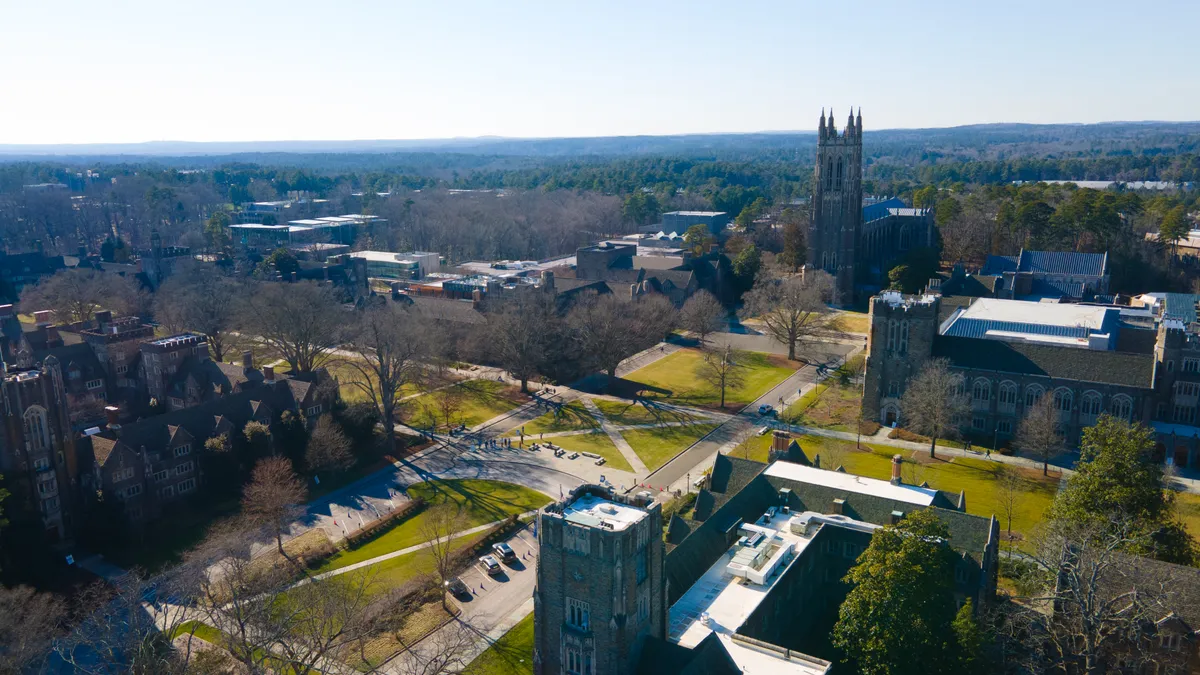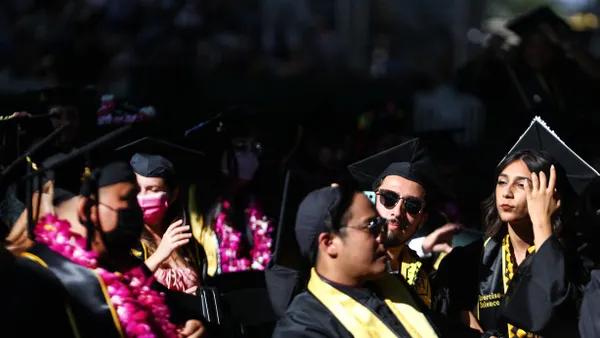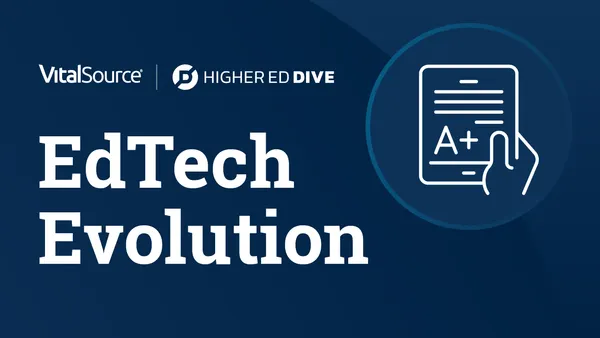Lori Varlotta, the distinguished professor of higher education leadership at California Lutheran University, is president emerita of Hiram College, in Ohio, and the former president of California Lutheran University.
In 1992, Democratic strategist James Carville famously quipped “It’s the economy, stupid” as the theme to reach voters. This is now the very trope (minus the word stupid, of course) that today’s academic leaders should use to explain college's return on investment.
For years, educators have relied on clear and convincing research to show that college degrees significantly improve adults’ employment prospects and earnings potential. But there are many personal and societal benefits a college degree imparts. Data on other areas of the college graduate’s life — their financial security, access to critical benefits and healthy behaviors — should also be used to make a broader and more compelling case for higher education’s value proposition.

Additionally, American society at large benefits from a citizenry that has attained postsecondary education. Because college graduates earn higher wages, they pay more taxes at the local, state and federal levels. They are also much less likely to apply for and receive social support benefits, such as unemployment benefits. And they’re more likely to be civically engaged, vote and be philanthropic.
Below are several benefits associated with earning a college degree that college officials can use to explain the ROI of higher education.
Earnings
In general, those with a college degree earn more annually and throughout their lifetime compared to those who have not attended college.
In 2021, the median income of bachelor’s degree recipients who were working full time was $29,000 — 65% higher than those who only received a high school diploma, according to a report last year from the College Board. Other data shows the lifetime earnings of a college graduate will exceed that of a high school graduate by $1.2 million.
Meanwhile, the earnings gap for workers between the ages of 22 and 27 with a bachelor’s degree versus those with only a high school diploma has been increasing for decades. According to recent data from the Federal Reserve Bank of New York, that gap grew even larger in 2023 — $60,000 for college-educated workers vs. $36,000 for those with high school diplomas.
It’s important to note that this data does not imply a simple cause-and-effect relationship. We know that the attainment of the college degree is correlated with other variables, including parents’ degree attainment, family socioeconomic status, and the individual characteristics of the students, such as academic abilities, motivation and grit.
Employment opportunities
College graduates have significantly more job opportunities and security.
From 2002 to 2022, the College Board report shows that the unemployment rate for workers with at least a bachelor’s degree was approximately half of that for high school graduates.
More recent unemployment data reflects this two-decade trend, showing that the unemployment rate in 2023 for bachelor’s degree holders was 2.2% versus 3.9% for those with only a high school education. College degree recipients also weathered the pandemic-related unemployment storm better than those without a degree.
However, the gap in unemployment rates between workers with and without bachelor’s degrees is not uniform across all racial and ethnic groups. The gap is widest for Black workers (5.5 percentage points), followed by Asian workers (4.7 percentage points), Hispanic workers (2.6 percentage points), and White workers (2.5 percentage points), according to the College Board report.
Employment-related benefits
College-degree earners are much more likely to have access to and participate in job-provided health insurance and retirement plans than those without degrees, according to the College Board report.
Nearly half of full-time workers in the private sector with bachelor’s degrees, 45%, have access to a retirement plan, compared with 38% of those with only a high school diploma. Of the college-educated workers, 89% participate in these programs versus 81% of workers who only completed high school.
Similar trends are found in the public sector. Three-quarters of full-time, public sector workers with bachelor’s degrees are offered retirement plans, compared with 71% of workers with only high school diplomas. College-educated workers were five percentage points more likely to participate in those plans than the other group, 95% versus 90%.
Similarly, 66% of full-time employees with four-year degrees were covered by employee-provided health insurance in 2021, compared with 53% of full-time workers who only graduated from high school.
Healthy habits and longevity
College-educated adults are more likely than those without degrees to develop healthy habits that correlate to longer lives.
For instance, adults with bachelor’s degrees or higher are almost four times less likely to smoke than their counterparts who only have a high school education, according to the College Board report. College-educated adults are also roughly twice as likely to engage in weekly vigorous exercise.
In 2021, the life expectancy for bachelor’s degree holders was eight-and-a-half years higher (83 years old) than that of high school graduates (75 years old).
Poverty, public assistance and taxes
Given the earnings premium college-educated workers often enjoy, it should come as no surprise that both the poverty rate and participation in public assistance fall as educational attainment increases.
In 2021, 4% of bachelor’s degree holders lived in a poverty-level household — roughly three times less than the percentage of high school-only graduates (13%) who lived in those households, according to the College Board report. During that same year, four-year college graduates were also much less likely to receive Medicaid, Supplemental Nutrition Assistance Program benefits or housing assistance.
This confirms the government pays significantly less to support college graduates than those who only graduated high school. Meanwhile, those with bachelor’s degrees paid 86% more in 2021 taxes than graduates of high school only.
Voting, civic engagement and philanthropy
A healthy and vibrant democratic economy depends on its members to vote, become and stay civically engaged and be charitable. Research convincingly demonstrates that college degrees move an economy forward in each of these areas.
In the last presidential election, 25- to 44-year-old adults with at least a bachelor’s degree turned out to vote at a rate more than thirty percentage points higher than their peers who only held a high school degree — 77% versus 46%.
These differences hold true when it comes to volunteerism, according to the College Board report. The percentage of bachelor’s degree holders who participated in such activities was 40%, 21 percentage points higher than high school-only graduates, 19% of whom volunteered.
In addition to using their time and talent to vote and volunteer, college graduates also give more cash donations to various organizations.
The U.S. Bureau of Labor Statistics tracks contributions across several types of organizations, including charities, religious organizations, and educational institutions.
College graduates annually make higher cash donations to all three types of these organizations compared to their counterparts without college degrees.
Across these three organization types, bachelor’s degree holders made annual cash donations roughly 3.5 times higher than those who only finished high school, according to an analysis of BLS data from a 2012 Lumina Education report.
The takeaway
Facts matter. Using data-driven examples to expand the conversation about a college degree's financial return should serve universities and their stakeholders well as we move into this election and continue the work of educating the next generation of leaders.











